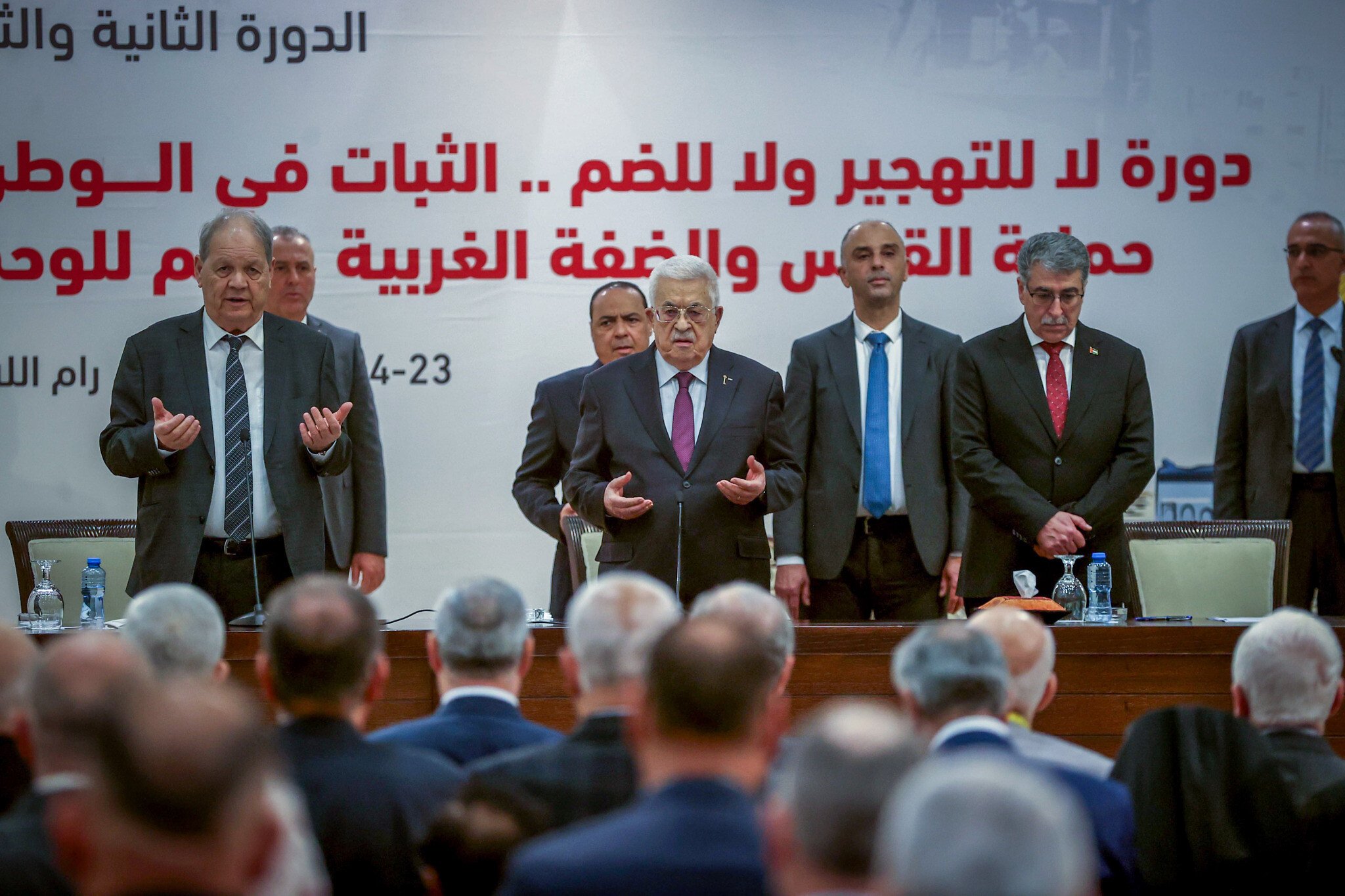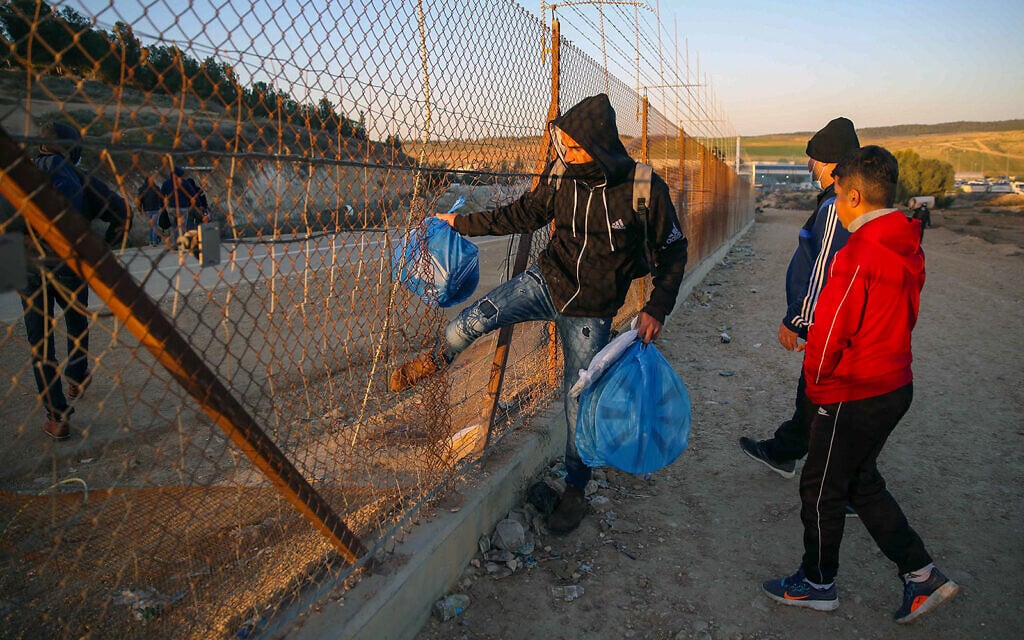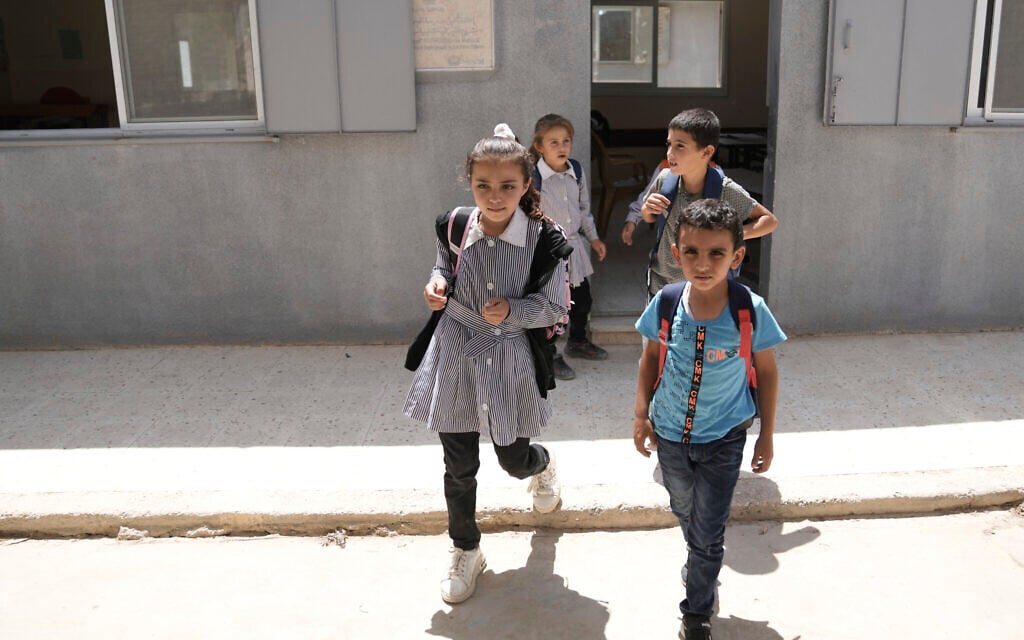


In recent days, as the Palestinian Authority’s long-running financial crisis has put mounting pressure on Palestinian West Bank families, an audio clip went viral in which two unidentified men lament that the PA is “finished.”
“The prime minister told the ministers that there are no salaries, no money,” one of the men says in the six-minute clip, referring to the PA’s prime minister, Mohammad Mustafa. PA President Mahmoud Abbas, he feared, “will hand over control of the Authority to the Israeli side.”
The identity of the speakers is unknown, but their familiarity with the government may indicate that they’re members of the Fatah faction that dominates the PA. Shortly after the clip spread, Palestinian police announced the arrests of three people in Ramallah under a law that criminalizes social media incitement and, effectively, criticism of the PA or Abbas. Police warned, “We caution anyone attempting to harm public security or stir unrest among citizens.”
The arrests reflect not only the PA’s repressive tactics, but also the extent to which a worsening solvency crisis is endangering the authority. The authority’s dearth of cash has left Palestinian workers without pay, classrooms shuttered, and the government struggling to function as Israel withholds tax revenue.
The situation has gotten so acute as to prompt concern from the US ambassador about a possible PA collapse. And it’s accentuated warnings from Israel’s defense establishment that the financial troubles could pose security risks to Israel from an increasingly distressed population. Those warnings gained urgency following Monday’s terror attack in Jerusalem, in which two West Bank Palestinians killed six Israelis at a bus stop.
“There will be dangerous consequences to the economic situation, certainly for security,” said Samah al-Atout, an expert on the Palestinian economy from the West Bank’s An-Najah University. “If basic needs are not met, if there is no income, and young people are unemployed, the security situation will not remain stable.”
The starkest sign of the financial crisis came last week, when more than 600,000 children who were due to start classes in PA schools were told to stay home. At the end of August, the Palestinian Education Ministry announced a one-week postponement of the school year, citing the authority’s acute economic distress.
In recent years, the school year in the Palestinian Authority would reliably begin on September 1. In 2024, the year following the Hamas-led October 7, 2023, attack on Israel, classes started on September 9, as the Palestinian Teachers’ Union cited delays in preparing for the new school year.
The postponement this year came after a Palestinian cabinet meeting on August 31, where Mustafa acknowledged that “the Palestinian economy has contracted by 30% over the past year.” Two days later, in an emergency cabinet session on the school closures, he said that “preparations for the start of the school year were not completed as a result of the continuation of the economic situation.”
The core reason for the school year’s late start, judging from recent Palestinian media reports, is a delay in paying teachers’ salaries. Teachers in PA schools are part of the civil service, which means that recently, their paychecks have been delayed by months and have contained only a portion of their wages.
This summer saw a nadir in PA salary payments: Paychecks for May were issued at the end of July. For five weeks, some 90,000 PA employees received no salary at all. On September 7, the PA Finance Ministry announced that June salaries would be paid that same day, but only at 50%, with a guaranteed minimum of NIS 2,000 (roughly $600) per employee.
According to Atout, until October 7, a third of Palestinian workers received public salaries, while another third worked in Israel. Both those sectors have since collapsed.
“The third consisting of civil servants are no longer receiving their salaries regularly,” he said. “And the same applies to the third who work in Israel.”
According to the Palestinian research institute AMAN, average monthly salaries for PA civil servants in 2025 ranged from NIS 1,250 ($375) at the low end to NIS 4,020 ($1,200) at the higher end per month – amounts that the PA is currently not paying in full. There are exceptions, such as high-risk roles or positions requiring medical or engineering degrees, which can reach NIS 10,000 ($3,000) a month.
In recent days, the head of the Palestinian Teachers’ Union, Saad Arzikat, said in an interview with an official PA media channel that he had received indications from officials that salaries would be partially paid before the school year begins on September 8, so that “the teacher can go to school with dignity.”
On September 7, after the Finance Ministry said June pay would be issued that day, the Teachers’ Union officially announced that classes would open on September 8.
The reason for the delayed and slashed paychecks is a string of accumulating financial shocks for the PA, which governs day-to-day affairs in the West Bank’s Palestinian population centers. At the core of the crisis is the PA’s long-running dependency on Israel’s economy and government.
About 65% of the PA’s budget comes from so-called clearance revenues, or tax transfers collected by Israel on its behalf under a 1994 agreement. These include income taxes from Palestinian workers and customs on goods passing through Israeli-controlled crossings. Research institutes estimate the monthly sum at roughly NIS 800 million ($215 million), or some NIS 9.6 billion ($2.9 billion) annually.
Over the past five years, Israel has deducted around NIS 500 million ($150 million) annually from these revenues. That number is based on the amount it says the PA continues to pay to security prisoners and their families, as well as those of slain terrorists, as part of what Israel calls its “pay-for-slay” policy.
Since the Hamas-led October 7, 2023, attack on Israel, which sparked a crackdown on terrorists in the West Bank, Israel has withheld additional PA revenues as well. It no longer transfers the monthly sums the PA once directed to Gaza, including pensions for ex-employees who served under the PA, and payments for electricity and water supplied to the Strip. Those funds totaled some NIS 120 million (nearly $36 million) per month.
Altogether, the Gaza and “pay-for-slay” withholdings constitute nearly NIS 2 billion ($600 million), or about a fifth of the total annual clearance revenues.

Far-right Finance Minister Bezalel Smotrich has advocated the shuttering of the PA and the annexation of much of the West Bank, a step that the Israeli government has reportedly entertained but that has drawn massive international blowback. Smotrich repeated his call to eliminate the PA after Monday’s attack.
In recent months, Palestinian and Israeli officials say Smotrich’s ministry has not transferred any clearance funds at all.
“A year and a half ago, we were receiving about 80% of the clearance revenues,” Mustafa said at a cabinet session in late August. “Over the past year, the average dropped to 30–40%. Now, for the fourth month in a row, no funds have been transferred. As a result, NIS 10 billion belonging to the PA is in Israel’s hands.”
Asked for comment, Israel’s Finance Ministry told The Times of Israel the matter falls under the direct authority of Smotrich. His office did not respond to an inquiry.
“The problem began with deductions from the clearance revenues – because of the [payments] to prisoners, because of the funds for Gaza, and at that stage the issue was partial,” Atout said. “But when the funds from the Israeli side were stopped entirely, and this has continued for some time, a major crisis emerged.”
Beyond tax transfers, two other pressures are squeezing the Palestinian economy – Israel’s strict limits on Palestinian employment in Israel, and a liquidity crisis with Israeli banks.
Before October 7, about 100,000 Palestinians worked inside Israel proper, and another 40,000 in West Bank settlements and industrial zones. Today, Israel allows only some 7,000 workers to cross the West Bank border each month, limited to “essential” sectors such as food processing. An additional 9,000 continue to work in settlements and industrial zones.
Altogether, this represents just 11% of the prewar Palestinian labor force employed in Israel. The loss of wages has slashed consumer spending across the West Bank, further depressing local markets.
The PA is also grappling with a long-running dispute with Israel over currency conversion. Under the 1993 Oslo Accords and their economic annex, Israel was meant to convert Palestinian-held shekels into foreign currency. But for years, Israel has capped those conversions at about NIS 18 billion ($5.4 billion) annually — far below the amounts circulating — as the Palestinian economy has grown since the 1990s.
Palestinian banks are now stuck with surpluses of shekels, forcing them to reject large deposits of the currency or transactions with it. The bottleneck is stifling commerce both inside and outside the Palestinian territories. The Palestinian prime minister confirmed in a late-August government meeting that the crisis is still ongoing.
In recent months, the PA has sought foreign pressure on Israel to release the clearance funds. In July, the PA demanded international intervention to unlock more than $2 billion in withheld revenues, a European diplomat and a Palestinian official told The Times of Israel.
That same month, senior PA official Hussein al-Sheikh sent letters to EU foreign ministers urging them to press Israel to release about NIS 8 billion ($2.4 billion) in taxes and customs.

Recently, warnings have come from Washington. US Ambassador to Israel Mike Huckabee reportedly cautioned, amid global rumblings about annexation, that the collapse of the PA could lead to danger.
“If the Palestinian economy collapses, that is nobody’s victory,” Huckabee reportedly told Channel 12 earlier this month, adding that “desperate people do desperate things.”
Financial troubles within the Palestinian Authority have long been viewed by Israel’s security establishment as a gateway to security deterioration. This is because members of the Palestinian security forces are also directly affected by the crisis.
Israel’s longtime concern is that, in the event of a collapse, these forces may turn their weapons not toward counterterrorism in the West Bank, but toward carrying out attacks against Israel.
According to Channel 12, Israel’s Shin Bet security agency has quietly urged Prime Minister Benjamin Netanyahu to resume transferring funds to the PA, warning of destabilization in the West Bank. “We are beginning to see signs of the PA unraveling,” officials reportedly cautioned, per the network.
Atout echoed the idea that economic welfare is conducive to stability.
“This is something found in socio-economic theories worldwide,” he said. “If people have income, work, and hope, you create a framework of stability.”





